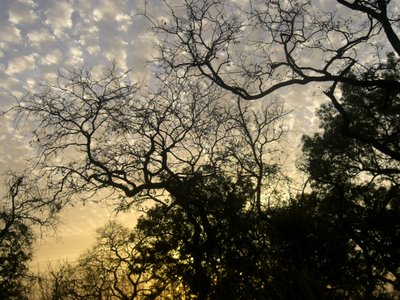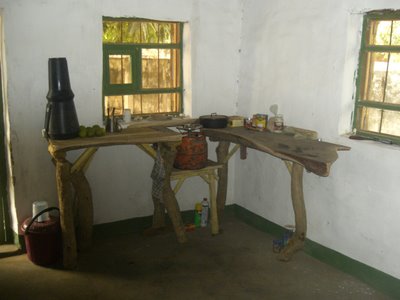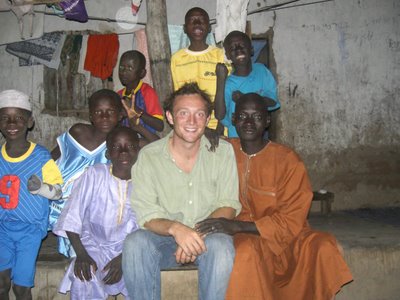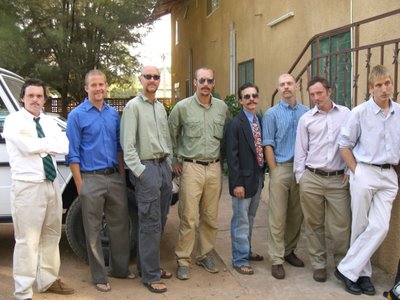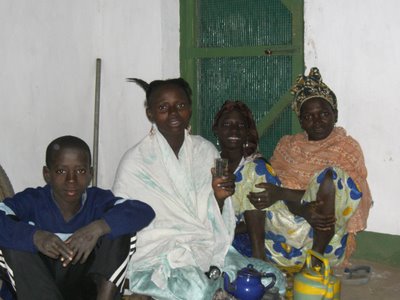Trash and Treasure...
A little story...
It was the label of Ray’s Downeast Schooner Mustard that was pressed on her forehead, its golden label shining bright in the sunlight. Its words described its quality and uniqueness as a small mustard mill from Maine, but this was strangely detached from its new role as a beauty aid. I had enjoyed the jar of mustard that it had come from, scooping spoonfuls into my mouth, my body craving its strong flavour, and in reality, craving any flavor. The staple Gambian diet cannot be considered a pinnacle of culinary delight, but more as an act of necessity. It becomes so mundane, rice and sauce, millet and sauce, and then rice a sauce again. An exotic flavour like mustard is enough to strike those memory chords to bring you back to different days, flavour escapism one might say. And it wasn’t the only one, spoonfuls of mayonnaise had become a favorite, along with a spoonful of tahini and not to be forgotten, the spoonful of peanut butter dipped into the strawberry jam as a dessert.
The jars of far off flavours had piled up behind my door over the course of months. With these were cans of different things, baked beans, sardines, canned corn and others. These being the foods that I ate when a lunch of boiled tomato paste and rotten fish sauce over white rice wouldn’t quite do it for me, and a spoonful of flavour wasn’t enough. Maybe this represented some weakness on my part, an inability to show what some may call my solidarity, to really live like the locals, eat the food they survive on. Probably a couple of years ago I would have thought of my self being better than this, but somehow when you feel like your starving to death even though you’ve eaten your entire bowl of rice, these academic thoughts don’t seem so important. And at the end of the day, there are just certain things I just can’t let go of, weakness or no weakness. Food is one of them.
So yes, I don’t just eat the food of the locals and spend a fair amount of my income on buying alternative food. This presents an array of on the ground issues I have to face up to or outright avoid. The major one being that I can’t afford to share my stock of food with those I live with, there are twenty of them in the compound. So for their sake (what they don’t know can’t hurt them) and for mine (trying to maintain a reasonable feeling of nutrition), I feel obliged to hide my gluttonous desires. So I keep a low-profile when I’m cooking these luxury food items and I don’t eat in front of the window as to avoid a level of envy or jealousy. To put it into perspective, to eat a can of sardines every day would place me as one of the wealthiest people in the village and maybe the region. To have a pile of empty cans on the scale that existed behind my door was enough evidence to point me out as the selfish glutton I describe myself as, but would hate to be seen as.
My problem was trash, pure and simple, the evidence of my actions in the most visible form. So what to do with it? Carry two sardine cans out into the bush every day in my pockets and dispose of them out there? Maybe, but the smell of the pile was growing every day and the slow secretive disposal would take months. And I had also just found a scorpion living under a sardine can, an unsettling discovery so close to home. It had to be done in one fell swoop, I had to get rid of it in one day. But this would mean certain discovery of my horde, an admission that I, the generous and good intentioned volunteer that I liked to be seen as, would be found out. The debate in my head went back and forth over a couple of days until finally I went out one morning and the cloud of flies and the overwhelming smell nearly choked me.
I decided to own up. To finally let those I live with see me for who and what I am, a fellow who cannot fully let go of what I consider to be simple pleasures; a spoonful of two of mustard a day, a can of sardines at lunch and every so often, a plate of steaming baked beans. If they could connect the dots of my relative wealth and my lack of sharing, than so be it. I packed it all up in one of my empty rice bags, the cans and bottles tinking as I dropped them in and I lugged it out in the face of numerous curious eyes. What I occurred next was unexpected by me. Those curious eyes and ears, sensing those tell tale shapes and sounds of bottles and cans, lit up on the faces of the onlookers as they fell in behind, following me. Feeling a little bit like sad expression of Santa Clause, I dumped the bag in the back field of the compound, it making a massive noise as glass hit against glass, can against can. Then came the rush, women and children, my favorite old lady who cackled with a pipe in her mouth, came running, elbowing each other to get first dibs on what they appeared to see as priceless treasure. They completely ignored me I might add. The cans were pawed over, the biggest taken, the glass jars argued over, the eldest members succeeding in wrestling them out of younger hands, the children seemed content with the sardine cans and I stood there shocked by what I saw at the time as a crazy display over what I considered ‘my’ trash.
I was completely unsure how to intepret this whole scene and still have trouble thinking of this as normal. In some ways it could be seenm as a sad expression of poverty but I suppose in the most positive light, in getting rid of my trash, the people in my compound, my "family" here, were happy to have many of the things that I hid behind my door. They didn't resent me for eating sardines or beans, in fact, they were willing to race for the cans which would mean new kerosene lamps in the houses, the jars that would be used to keep cooking oil in and the sardine cans that would be fashioned into a whole range of toys by the children (be it slightly dangerious, but I suppose you should see them with knives). It was a treasure trove of containers in a place where containers are scarce. By no means was the gift of my trash a triumph of development, but maybe an interesting exercise of perception. That is, to live with people, respect them and enjoy them, and then have them fight over what you consider to be your trash. That what I see as my trash is not necessarily the same as what they see as their trash, something I didn’t fully appreciate until I saw that golden label of Ray’s Mustard adorning the forehead of a women I know.
It was the label of Ray’s Downeast Schooner Mustard that was pressed on her forehead, its golden label shining bright in the sunlight. Its words described its quality and uniqueness as a small mustard mill from Maine, but this was strangely detached from its new role as a beauty aid. I had enjoyed the jar of mustard that it had come from, scooping spoonfuls into my mouth, my body craving its strong flavour, and in reality, craving any flavor. The staple Gambian diet cannot be considered a pinnacle of culinary delight, but more as an act of necessity. It becomes so mundane, rice and sauce, millet and sauce, and then rice a sauce again. An exotic flavour like mustard is enough to strike those memory chords to bring you back to different days, flavour escapism one might say. And it wasn’t the only one, spoonfuls of mayonnaise had become a favorite, along with a spoonful of tahini and not to be forgotten, the spoonful of peanut butter dipped into the strawberry jam as a dessert.
The jars of far off flavours had piled up behind my door over the course of months. With these were cans of different things, baked beans, sardines, canned corn and others. These being the foods that I ate when a lunch of boiled tomato paste and rotten fish sauce over white rice wouldn’t quite do it for me, and a spoonful of flavour wasn’t enough. Maybe this represented some weakness on my part, an inability to show what some may call my solidarity, to really live like the locals, eat the food they survive on. Probably a couple of years ago I would have thought of my self being better than this, but somehow when you feel like your starving to death even though you’ve eaten your entire bowl of rice, these academic thoughts don’t seem so important. And at the end of the day, there are just certain things I just can’t let go of, weakness or no weakness. Food is one of them.
So yes, I don’t just eat the food of the locals and spend a fair amount of my income on buying alternative food. This presents an array of on the ground issues I have to face up to or outright avoid. The major one being that I can’t afford to share my stock of food with those I live with, there are twenty of them in the compound. So for their sake (what they don’t know can’t hurt them) and for mine (trying to maintain a reasonable feeling of nutrition), I feel obliged to hide my gluttonous desires. So I keep a low-profile when I’m cooking these luxury food items and I don’t eat in front of the window as to avoid a level of envy or jealousy. To put it into perspective, to eat a can of sardines every day would place me as one of the wealthiest people in the village and maybe the region. To have a pile of empty cans on the scale that existed behind my door was enough evidence to point me out as the selfish glutton I describe myself as, but would hate to be seen as.
My problem was trash, pure and simple, the evidence of my actions in the most visible form. So what to do with it? Carry two sardine cans out into the bush every day in my pockets and dispose of them out there? Maybe, but the smell of the pile was growing every day and the slow secretive disposal would take months. And I had also just found a scorpion living under a sardine can, an unsettling discovery so close to home. It had to be done in one fell swoop, I had to get rid of it in one day. But this would mean certain discovery of my horde, an admission that I, the generous and good intentioned volunteer that I liked to be seen as, would be found out. The debate in my head went back and forth over a couple of days until finally I went out one morning and the cloud of flies and the overwhelming smell nearly choked me.
I decided to own up. To finally let those I live with see me for who and what I am, a fellow who cannot fully let go of what I consider to be simple pleasures; a spoonful of two of mustard a day, a can of sardines at lunch and every so often, a plate of steaming baked beans. If they could connect the dots of my relative wealth and my lack of sharing, than so be it. I packed it all up in one of my empty rice bags, the cans and bottles tinking as I dropped them in and I lugged it out in the face of numerous curious eyes. What I occurred next was unexpected by me. Those curious eyes and ears, sensing those tell tale shapes and sounds of bottles and cans, lit up on the faces of the onlookers as they fell in behind, following me. Feeling a little bit like sad expression of Santa Clause, I dumped the bag in the back field of the compound, it making a massive noise as glass hit against glass, can against can. Then came the rush, women and children, my favorite old lady who cackled with a pipe in her mouth, came running, elbowing each other to get first dibs on what they appeared to see as priceless treasure. They completely ignored me I might add. The cans were pawed over, the biggest taken, the glass jars argued over, the eldest members succeeding in wrestling them out of younger hands, the children seemed content with the sardine cans and I stood there shocked by what I saw at the time as a crazy display over what I considered ‘my’ trash.
I was completely unsure how to intepret this whole scene and still have trouble thinking of this as normal. In some ways it could be seenm as a sad expression of poverty but I suppose in the most positive light, in getting rid of my trash, the people in my compound, my "family" here, were happy to have many of the things that I hid behind my door. They didn't resent me for eating sardines or beans, in fact, they were willing to race for the cans which would mean new kerosene lamps in the houses, the jars that would be used to keep cooking oil in and the sardine cans that would be fashioned into a whole range of toys by the children (be it slightly dangerious, but I suppose you should see them with knives). It was a treasure trove of containers in a place where containers are scarce. By no means was the gift of my trash a triumph of development, but maybe an interesting exercise of perception. That is, to live with people, respect them and enjoy them, and then have them fight over what you consider to be your trash. That what I see as my trash is not necessarily the same as what they see as their trash, something I didn’t fully appreciate until I saw that golden label of Ray’s Mustard adorning the forehead of a women I know.

